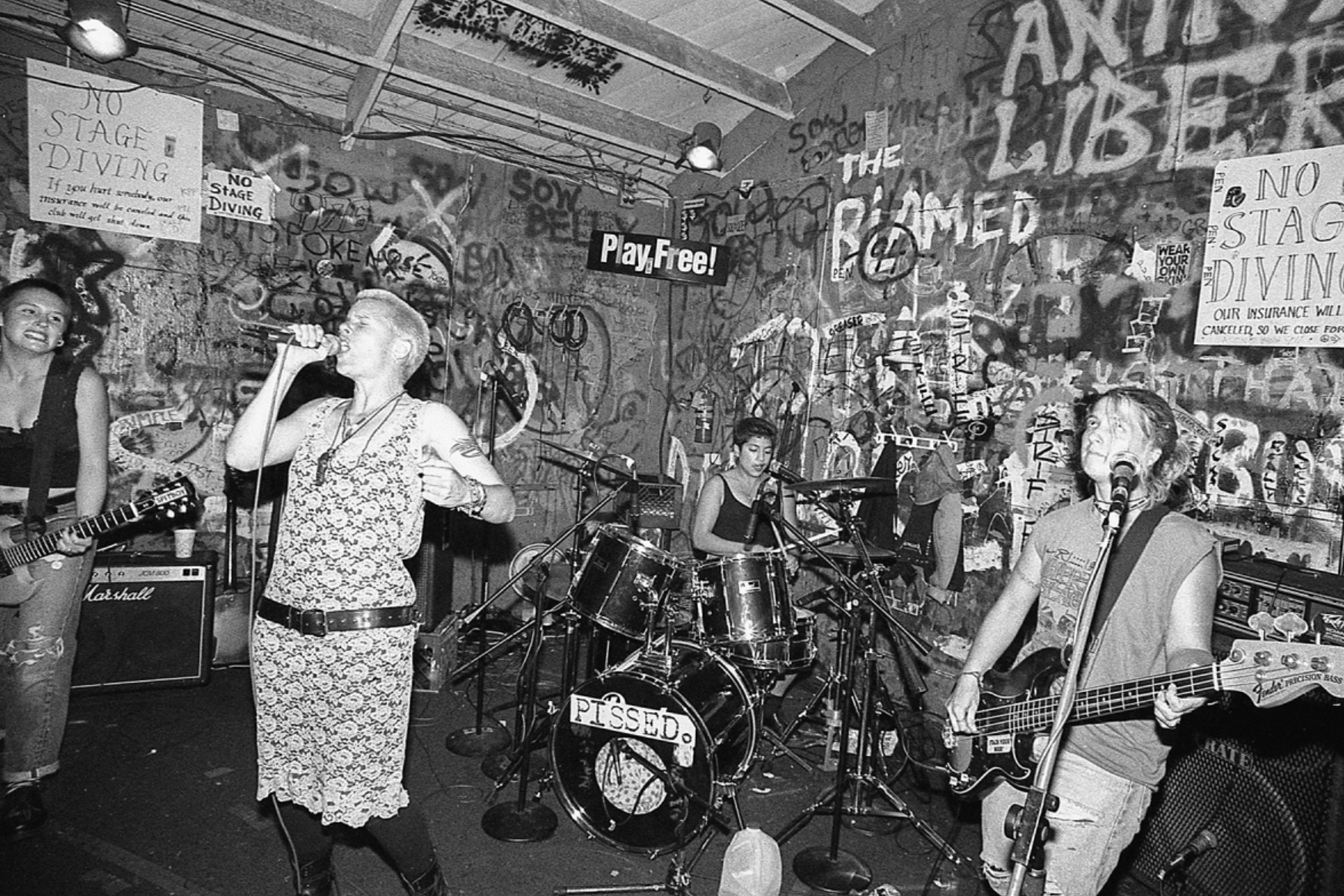Read Green Day frontman’s liner notes for new Spitboy compilation, Body of Work (1990 – 1995)
By Kory Grow
Rollingstone Magazine
June 2021
When Spitboy fell into the Bay Area punk scene like a hurricane in the early Nineties, they had one shared mission: to obliterate everything in America that oppressed women.
The four women were unapologetically intense and altogether uncompromising. Drummer Michelle “Todd” Gonzales detailed her list of enemies in the lyric sheet for their True Self Revealed LP in 1993. Her hit list included capitalist society, the media, patriarchy, big business, and the government. These, she said, were the true problem-makers in the world. “We are all victims together of the firm hand that molds the masses into what some like to call the ‘American Dream,’” she wrote. “Well, wake the fuck up because dreams are not reality.”
Spitboy’s music was just as cutting, making it the perfect vehicle for their message with vibrant, jagged guitar, violent drumming, and singer Adrienne Droogas’ commands like, “Learn to challenge the expectation of what defines a woman, of what defines a man” on a song like “In Tradition.” Between 1990 and 1995, they pressed their manifestos to small-press seven-inches and 12-inches, some of which was anthologized on 1994’s The Spitboy CD.
The band has collected its complete discography into a new compilation, Body of Work (1990-1995), which will come out on June 25th. The compilation is now available for preorder, and, true to their mission three decades ago, 100% of the proceeds from the compilation will benefit the National Women’s Law Center. In addition to a full accounting of Spitboy’s music, the record contains new liner notes by writer Vique Simba and Green Day frontman Billie Joe Armstrong, who witnessed some of Spitboy’s earliest shows.
Here, exclusively, are Armstrong’s full liner notes from Body of Work (1990 – 1995), which perfectly capture the pioneering punks’ spirit.
Sometime in 1991, there was a show at a co-op on the Berkeley campus called Cloyne Court, once the largest student-run housing cooperative. Green Day was playing last of a three-band bill, and I remember a particularly hostile mood in the room. Spitboy was playing a ferocious set. A crowd of about 300 were dancing and lurching to a point of violence and glee. It was one of those gigs that you were happy to be in the room to witness. There was a mix of East Bay punks, college kids, and even some frat boys in the crowd. It was like watching two different tribes attempting to coexist. It was joyful and hostile, and Spitboy seemed to be playing/screaming/preaching to the converted and the unconverted that night all at the same time. It was definitely not the typical East Bay punk scene we were accustomed to. We were not playing Gilman Street.
Singer Adrienne Droogas sang in personal and political prose that rang out through the room. Before the last song, she began to speak as if she was going to thank everyone for coming out. Instead, she shouted, “This is our last song, and it’s dedicated to all the sexist fucking assholes in the room.”
Boom!
Hostility took over, and I saw a few punches thrown. I was thinking, “Oh shit — this is about to get ugly.” And I guess it did get ugly for Spitboy’s remaining two-minute punk song, which also pummeled the crowd. I reckon it takes hostility to create change. That’s what Spitboy’s music represents, four women in their twenties, fueled by their passion and ethics to deliver a mission statement for change not only in the scene but also the world at large.
I always admired the drummer, Michelle Gonzales (Todd). I saw her first band Bitch Fight play a protest with MDC in San Francisco when I was about 16. After Bitch Fight broke up, a few years later, she told me about her new band, Spitboy. She was very excited. I thought, “What a great name for a band.” https://www.youtube.com/embed/f5yn9zQSCIQ?feature=oembed
I saw their first show at Gilman, and it was like, “Holy shit, this band is not fucking around.” I told Michelle I thought they were great. She looked at me and sorta snarled. As if to say “thanks” and “duh” at the same time. It’s one of the reasons I admired her, and Spitboy, too.
They were one of those bands that were a prequel to what the future was becoming. Feminism, human rights, animal rights, environmental protection, gender issues … Spitboy was singing about these issues 30 fucking years ago. I’m so grateful to have witnessed it.
— Billie Joe Armstrong, June 21, 2020






